UPDATE — AUGUST 2025: California Governor Gavin Newsom has vetoed Senate Bill 1047, the closely watched Safe and Secure Innovation for Frontier Artificial Intelligence Models Act. The bill, which sought to impose strict safety and security requirements on developers of powerful AI systems, had drawn global attention and support from leading AI researchers. Newsom cited concerns that the framework was too narrow, risked stifling innovation, and could create a false sense of security, underscoring the state’s ongoing debate over how best to regulate AI.
ORIGINAL NEWS STORY:
Landmark California AI Safety Bill Awaits Governor’s Signature
All eyes are on California Governor Gavin Newsom after the California Senate passed Senate Bill 1047 (SB 1047), a landmark bill aimed at regulating the use and development of advanced artificial intelligence (AI) systems. Introduced by Senator Scott Wiener, the Safe and Secure Innovation for Frontier Artificial Intelligence Models Act is designed to impose strict safety and security protocols on developers of powerful AI models, particularly those that could pose critical risks to public safety.
The bill reflects California’s proactive approach to managing the potential dangers associated with AI technology. The legislation specifically targets developers of AI systems that require substantial computational resources, defined as models costing over $100 million to train. These systems are subject to rigorous testing for safety, cybersecurity protections, and regular audits by third-party experts. The bill also requires developers to create a comprehensive safety and security protocol that must be shared with the California Attorney General, ensuring transparency and accountability in the development process.
Balancing Innovation and Public Safety
Senator Wiener emphasized the importance of pairing innovation with responsibility. “Innovation and safety can go hand in hand—and California is leading the way,” Wiener said. “The Legislature has taken the truly historic step of working proactively to ensure an exciting new technology protects the public interest as it advances.”
The bill has drawn strong support from leading AI researchers, including Geoffrey Hinton and Yoshua Bengio, two of the most cited AI researchers globally. Hinton, often referred to as one of the “Godfathers of AI,” praised the legislation for its sensible approach to addressing the real risks posed by advanced AI systems. He highlighted the importance of having legislation with “real teeth” to prevent potential harms while still allowing AI to advance in beneficial ways, such as in science and medicine.
Democratizing AI Development
SB 1047 also proposes the creation of CalCompute, a public cloud computing cluster designed to support startups, researchers, and community organizations in developing AI responsibly. The initiative aims to democratize access to computing resources and ensure that innovation is not restricted to major technology corporations. Additionally, the bill includes whistleblower protections to encourage employees within AI companies to report safety concerns without fear of retaliation. Supporters say these safeguards will help maintain integrity and accountability across the state’s expanding AI ecosystem.
Debate Over the Bill’s Scope
Despite broad bipartisan support, some lawmakers and industry leaders have criticized the measure for not addressing the full complexity of AI regulation. During an appearance on KQED’s Forum, former House Speaker Nancy Pelosi argued that the bill, while well-intentioned, fails to capture the rapid pace of AI innovation.
“California is the home, the birthplace of AI,” Pelosi said. “It has the knowledge, the entrepreneurship, and the responsibility to do the right thing—not to pass a bill that does not do the job because it is as well-intentioned as it is ill-informed.” Her comments underscore an ongoing debate about whether AI regulation should remain at the state level or fall under a national framework. Many experts warn that fragmented state laws could complicate compliance for developers operating across jurisdictions.
Strong Public Support
Public polling shows widespread approval for SB 1047, with voters across party lines expressing concern about the unchecked growth of AI. Technology workers have also rallied behind the bill, recognizing the need for robust safety requirements in an industry advancing at record speed.
Nathan Calvin, Senior Policy Counsel at the CAIS Action Fund, called SB 1047 a vital step toward responsible innovation. “The vast majority of Californians support this bill, and it’s great to see lawmakers agree,” Calvin said. “By putting in place safety testing requirements and guardrails, SB 1047 would drive both safety and innovation at the frontier of generative AI.” Governor Newsom had until September 30 to sign SB 1047 into law or issue a veto.
Need Help?
If you’re wondering how California’s AI bill, or any other AI regulation worldwide, could affect your business, contact BABL AI. Their Audit Experts can answer your questions, clarify compliance requirements, and provide strategies for responsible AI implementation.





